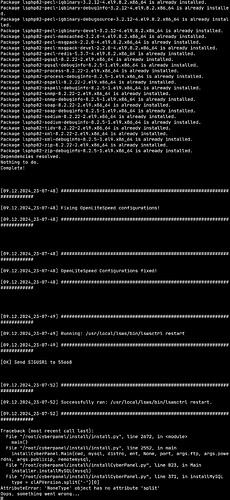Hello,
I am posting this because this appears to have been an issue mentioned before for AlmaLinux 8 users, and the solution posted was to use CyberPanel v2.3.5 install of the current v2.3.6. I will try that, but I wanted to identify that I am also experiencing this issue on RHEL 9. For transparency, I did an in place upgrade from RHEL 8 to RHEL 9 using ‘leapp upgrade’ which is the official method provided by Red Hat for an IPU.
Here is a link to the other thread I mentioned:
https://community.cyberpanel.net/t/error-installing-cyberpanel/53757
Here’s a screenshot of the error where it occurs:
I don’t know python (I know, I’m pathetic, right?). Many errors I can troubleshoot anyway, but I’m not sure on this one.
Interestingly, I installed the same CyberPanel script without error the other day on AlmaLinux 9 that was installed natively as el9 and not upgraded from 8 to 9. Since my install is RHEL 8 upgraded to RHEL 9, and the other problems were experienced on EL8, I can’t help but wonder if there’s something residual from 8 that is causing this issue even after the IPU.
Upgrading to RHEL 9 makes Python 3.9 the default, but in RHEL 8, python 3.6 is the default. Could it be that either the script is somehow using the python 3.6? Or is a higher version of python than 3.9 required? Thanks!
I may have an idea. ‘self.ftp’ is set to None because I chose not to install postfix, clouddns, or the ftp server. I’ll keep digging, but it’s one of the variables shown in the traceback.
It actually refers to 2 lines in install CyberPanel.sh. one line is 371 which is here:
command = 'dnf install mariadb-server -y'
elif self.distro == cent8 or self.distro == openeuler:
clAPVersion = FetchCloudLinuxAlmaVersionVersion()
>>> type = clAPVersion.split('-')[0]
version = int(clAPVersion.split('-')[1])
it looks like it’s trying to split the distro version number, maybe to pull the major version from the minor version?
Near the top of the script, I noticed that any 9.x version of alma is identified as al93 (9.4 is the current release of el9 btw). There’s some weird stuff throughout the various scripts as far as detecting distro version. For example, in the install.sh file, I have to modify the initial detect of the distro by changing the string that it looks for for alma9, in order to work on red hat 9. However, the next distro version check properly detects the distro as Red Hat.
Also, the initial detections seem to report el9 as centos8. This only seems to be for the first check, as the proper epel and remi distros get installed. It is odd that it removes them first tho and then reinstalls them. Anyway, will keep this updated.
EDIT: so for myself I’m bypassing it by removing the check and just doing the non cloud Linux commands.
The other line it points to is 851, which has to do with the self.ftp. it looks as if the script is set to install poweredns and ftp if the value is either y or None. However, it shouldn’t be none, because I definitely hit n.
For better troubleshooting:
The install options I choose when running through the install script are:
- Install CyberPanel
- Install openlitespeed
- N for full install
- N for postfix
- N for dns
- N for ftp
- N for remote MySQL
- Y for memcached
- Y for redis
- Enter (yes) for watchdog
